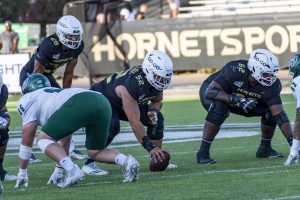News briefs: Number of sexual offenses down, car thefts up
November 4, 2007
Report: Sexual offenses down
The number of on-campus, forcible sexual offenses decreased slightly last year from 2005, while the number of offenses in the surrounding neighborhood increased, according to the Jeanne Clery Report, which is released annually by University Police.
Although the totals make it appear as though these offenses are on the rise, on-campus offenses actually decreased, said University Police Sgt. Kelly Clark.
The report shows three forcible sexual offenses occurred on campus in 2006, down from four in 2005.
The definition of forcible sexual offenses include rape, sodomy and fondling, but specific information about the 2006 incidents was not released.
“It’s important to be cautious when we interpret the numbers for a small sampling of crime,” Clark said.
He said while crime awareness is important, statistics and percentages can be misleading.
When a rise in sexual offense incidents occurs, people might react strongly to what looks like a crime wave, when in reality, the police might be doing their jobs better.
“Maybe people are more willing to report the crime, and more trusting of us, the cops,” he said.
Jessica Heskin, Violence and Sexual Assault Support Services advocate and Women’s Resource Center educator, said she would guess that only 80 percent of sexual assaults that occur on campus are actually reported.
“When you look at Clery statistics, they’re not exactly a be-all, end-all number,” Heskin said.
She said because Sac State students commute, most sexual assaults are happening off campus. Other schools may have higher numbers of sexual assaults, but they have more people living on campus.
Heskin said she sees about 50 sexual assault cases each year, even though less than 10 of those are included on the Clery Report.
“I have a full-time job for a reason,” she said.
To Heskin, the most important way to protect students is by addressing misconceptions about sexual assault.
One of those misconceptions is that someone is more likely to be assaulted by a stranger than an acquaintance. She said 85 percent of all assaults are actually committed by someone the victim knows.
Heskin has two recommendations for protecting yourself. The first is “buddy system, buddy system, buddy system,” she said. “When you go to a party, go together, leave together, stay together. Have someone sober.”
The second is that women have to trust their instincts and stick to their boundaries, she said.
More than 90 percent of all predators are male, whether or not their victims are female, Heskin said.
“The bottom line is, males have to stop this,” she said.
Lynde Gregg, a senior in nursing, said she always felt safe on campus because she often sees officers patrolling, and has never been a victim of crime on campus.
“That’s the thing that would lead to mistrust,” she said.
Students can contact the Women’s Resource Center at (916) 278-7388. Male students can also volunteer for the One Man Can Program, which is an alliance against violence, by calling Manuel Lopez at (916) 278-2735.
Report: Auto thefts on the rise
As of last year, vehicle thefts at Sacramento State had more than doubled since 2005, according to this year’s Jeanne Clery Report.
According to the Clery Report, in 2005, 33 vehicles were either stolen or attempted to be stolen. That number jumped to 58 in 2006.
University Police Sgt. Kelly Clark said it’s important to be aware that crime happens on campus, and to help the police by reporting crime.
“We need assistance from the community,” he said. “A safe campus is everyone’s responsibility. If you see something, call us.”
According to a Sacramento Police Department brochure, more than 7,000 vehicles are stolen each year in the Sacramento area. The estimated value for that loss is more than $40 million.
Sacramento Police Department Public Information Officer Konrad Von Schoech said it’s hard to say why Sacramento has such a high rate of auto thefts.
“There are probably many factors involved,” Von Schoech said.
He said auto theft punishments might not be severe enough to deter crime.
The good news, he said, is the recovery rate for stolen vehicles is high.
Senior nursing major Jenna VanderDussen said she feels safe because she never really hears about crime happening on campus.
You can protect your car against theft by locking it regularly, parking in well-lit, high-pedestrian traffic areas, and installing disablers, alarms or locks on various parts of the car, according to a department brochure.
If you have information about stolen cars or would like to report a theft, contact University Police at (916) 278-6851 or the Sacramento Police Department at (916) 264-7288.
Lacey Waymire can be reached at [email protected].
























































































































